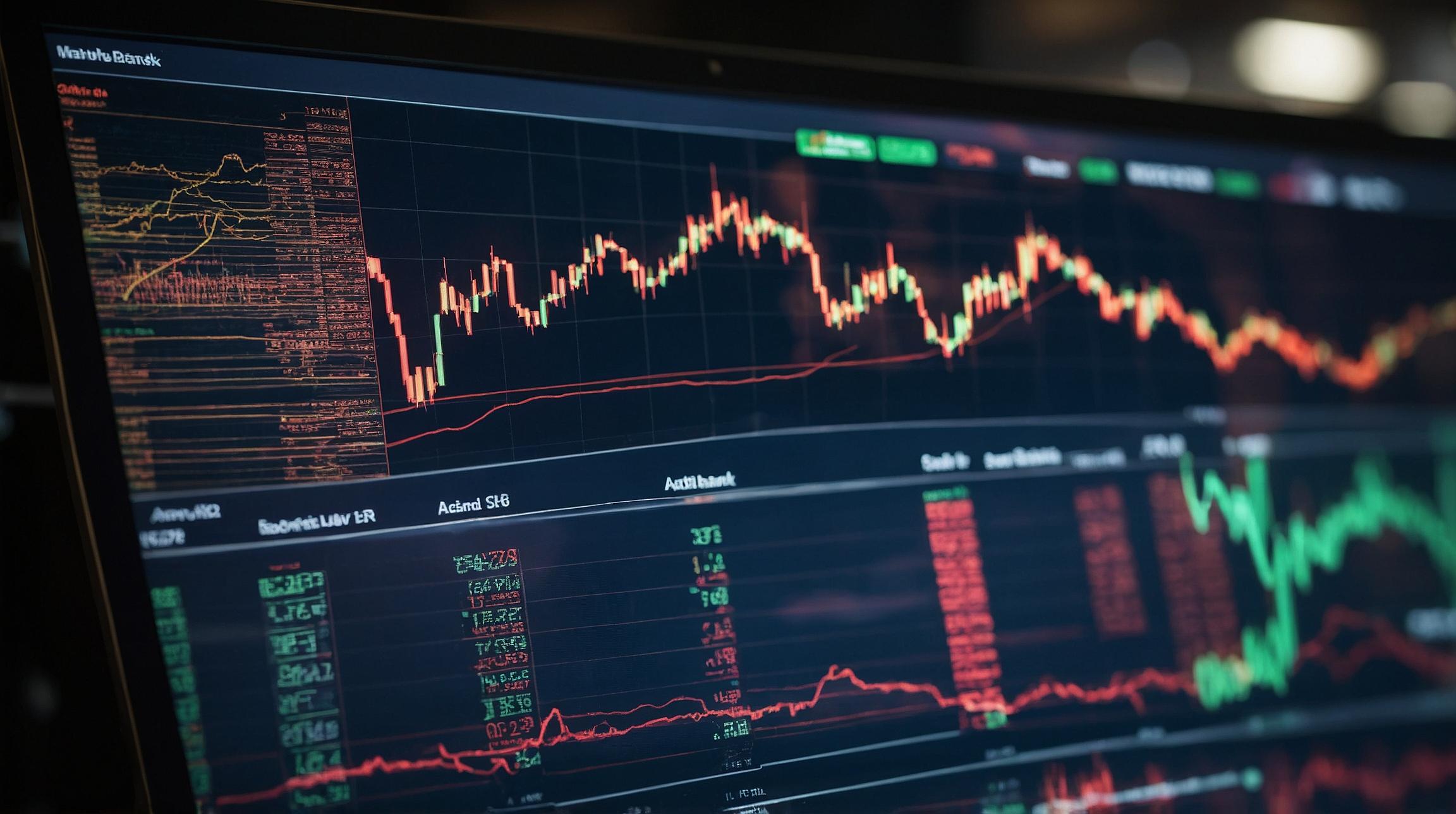The Asia-Pacific market landscape remains nuanced as central banks balance inflation risks against economic growth and employment trends. The RBA’s upcoming decision is pivotal, with inflationary pressures suggesting possible tightening, while labor market softness could restrain rate hikes. !-- wp:paragraph -->
Contents
FinOracleAI — Market ViewFinOracleAI — Market ViewRegional Equity Index MovementsU.S. Markets Rebound Following Inflation DataFinOracleAI — Market ViewRegional Equity Index MovementsU.S. Markets Rebound Following Inflation DataFinOracleAI — Market ViewReserve Bank of Australia Faces Inflationary PressuresRegional Equity Index MovementsU.S. Markets Rebound Following Inflation DataFinOracleAI — Market ViewAsia-Pacific Markets Show Mixed Performance Ahead of RBA MeetingReserve Bank of Australia Faces Inflationary PressuresRegional Equity Index MovementsU.S. Markets Rebound Following Inflation DataFinOracleAI — Market View
- Opportunities: Selective gains in Australian and South Korean equities may continue if inflation remains contained and policy stays accommodative.
- Risks: Elevated inflation readings could prompt unexpected tightening, pressuring equity valuations, particularly in sensitive sectors.
- Japan’s recent peak followed by a pullback highlights volatility risks amid shifting investor sentiment.
- U.S. inflation data remains a key driver for global market direction in the near term.
FinOracleAI — Market View
The Asia-Pacific market landscape remains nuanced as central banks balance inflation risks against economic growth and employment trends. The RBA’s upcoming decision is pivotal, with inflationary pressures suggesting possible tightening, while labor market softness could restrain rate hikes. !-- wp:paragraph -->- Opportunities: Selective gains in Australian and South Korean equities may continue if inflation remains contained and policy stays accommodative.
- Risks: Elevated inflation readings could prompt unexpected tightening, pressuring equity valuations, particularly in sensitive sectors.
- Japan’s recent peak followed by a pullback highlights volatility risks amid shifting investor sentiment.
- U.S. inflation data remains a key driver for global market direction in the near term.
FinOracleAI — Market View
The Asia-Pacific market landscape remains nuanced as central banks balance inflation risks against economic growth and employment trends. The RBA’s upcoming decision is pivotal, with inflationary pressures suggesting possible tightening, while labor market softness could restrain rate hikes. !-- wp:paragraph -->- Opportunities: Selective gains in Australian and South Korean equities may continue if inflation remains contained and policy stays accommodative.
- Risks: Elevated inflation readings could prompt unexpected tightening, pressuring equity valuations, particularly in sensitive sectors.
- Japan’s recent peak followed by a pullback highlights volatility risks amid shifting investor sentiment.
- U.S. inflation data remains a key driver for global market direction in the near term.
Regional Equity Index Movements
- Australia’s S&P/ASX 200 gained 0.43%, reflecting cautious optimism ahead of the RBA announcement.
- South Korea’s Kospi rose 1.05%, with the small-cap Kosdaq up 0.82%, supported by positive investor sentiment.
- Japan’s Nikkei 225 declined 0.68%, and the broader Topix index fell 1.27% after reaching a record high on Friday.
- Hong Kong’s Hang Seng index futures traded higher at 26,290, signaling a potentially positive open following recent gains.
U.S. Markets Rebound Following Inflation Data
Friday saw a rebound in U.S. equity markets after key inflation data was released. The Dow Jones Industrial Average advanced 299.97 points (0.65%) to close at 46,247.29, while the S&P 500 increased 0.59% to 6,643.70. The Nasdaq Composite rose 0.44% to settle at 22,484.07. !-- wp:paragraph --> This rally ended a three-day losing streak for the major U.S. indexes, though all closed the week slightly down. The Nasdaq and S&P 500 registered weekly losses of 0.7% and 0.3%, respectively, marking their first weekly declines in a month. The Dow ended the week 0.2% lower. !-- wp:paragraph -->FinOracleAI — Market View
The Asia-Pacific market landscape remains nuanced as central banks balance inflation risks against economic growth and employment trends. The RBA’s upcoming decision is pivotal, with inflationary pressures suggesting possible tightening, while labor market softness could restrain rate hikes. !-- wp:paragraph -->- Opportunities: Selective gains in Australian and South Korean equities may continue if inflation remains contained and policy stays accommodative.
- Risks: Elevated inflation readings could prompt unexpected tightening, pressuring equity valuations, particularly in sensitive sectors.
- Japan’s recent peak followed by a pullback highlights volatility risks amid shifting investor sentiment.
- U.S. inflation data remains a key driver for global market direction in the near term.
Regional Equity Index Movements
- Australia’s S&P/ASX 200 gained 0.43%, reflecting cautious optimism ahead of the RBA announcement.
- South Korea’s Kospi rose 1.05%, with the small-cap Kosdaq up 0.82%, supported by positive investor sentiment.
- Japan’s Nikkei 225 declined 0.68%, and the broader Topix index fell 1.27% after reaching a record high on Friday.
- Hong Kong’s Hang Seng index futures traded higher at 26,290, signaling a potentially positive open following recent gains.
U.S. Markets Rebound Following Inflation Data
Friday saw a rebound in U.S. equity markets after key inflation data was released. The Dow Jones Industrial Average advanced 299.97 points (0.65%) to close at 46,247.29, while the S&P 500 increased 0.59% to 6,643.70. The Nasdaq Composite rose 0.44% to settle at 22,484.07. !-- wp:paragraph --> This rally ended a three-day losing streak for the major U.S. indexes, though all closed the week slightly down. The Nasdaq and S&P 500 registered weekly losses of 0.7% and 0.3%, respectively, marking their first weekly declines in a month. The Dow ended the week 0.2% lower. !-- wp:paragraph -->FinOracleAI — Market View
The Asia-Pacific market landscape remains nuanced as central banks balance inflation risks against economic growth and employment trends. The RBA’s upcoming decision is pivotal, with inflationary pressures suggesting possible tightening, while labor market softness could restrain rate hikes. !-- wp:paragraph -->- Opportunities: Selective gains in Australian and South Korean equities may continue if inflation remains contained and policy stays accommodative.
- Risks: Elevated inflation readings could prompt unexpected tightening, pressuring equity valuations, particularly in sensitive sectors.
- Japan’s recent peak followed by a pullback highlights volatility risks amid shifting investor sentiment.
- U.S. inflation data remains a key driver for global market direction in the near term.
Reserve Bank of Australia Faces Inflationary Pressures
The Commonwealth Bank of Australia (CBA) highlighted the challenging position facing the RBA, noting that August’s consumer price index (CPI) data suggests “material upside risks to Q3 inflation.” This inflationary pressure coincides with a cyclical upswing in economic activity, complicating the central bank’s policy decisions. !-- wp:paragraph --> Conversely, CBA economists also pointed out signs of easing labor market conditions, including softer employment figures and moderating wage growth, which could temper the RBA’s inclination to raise rates. !-- wp:paragraph -->Regional Equity Index Movements
- Australia’s S&P/ASX 200 gained 0.43%, reflecting cautious optimism ahead of the RBA announcement.
- South Korea’s Kospi rose 1.05%, with the small-cap Kosdaq up 0.82%, supported by positive investor sentiment.
- Japan’s Nikkei 225 declined 0.68%, and the broader Topix index fell 1.27% after reaching a record high on Friday.
- Hong Kong’s Hang Seng index futures traded higher at 26,290, signaling a potentially positive open following recent gains.
U.S. Markets Rebound Following Inflation Data
Friday saw a rebound in U.S. equity markets after key inflation data was released. The Dow Jones Industrial Average advanced 299.97 points (0.65%) to close at 46,247.29, while the S&P 500 increased 0.59% to 6,643.70. The Nasdaq Composite rose 0.44% to settle at 22,484.07. !-- wp:paragraph --> This rally ended a three-day losing streak for the major U.S. indexes, though all closed the week slightly down. The Nasdaq and S&P 500 registered weekly losses of 0.7% and 0.3%, respectively, marking their first weekly declines in a month. The Dow ended the week 0.2% lower. !-- wp:paragraph -->FinOracleAI — Market View
The Asia-Pacific market landscape remains nuanced as central banks balance inflation risks against economic growth and employment trends. The RBA’s upcoming decision is pivotal, with inflationary pressures suggesting possible tightening, while labor market softness could restrain rate hikes. !-- wp:paragraph -->- Opportunities: Selective gains in Australian and South Korean equities may continue if inflation remains contained and policy stays accommodative.
- Risks: Elevated inflation readings could prompt unexpected tightening, pressuring equity valuations, particularly in sensitive sectors.
- Japan’s recent peak followed by a pullback highlights volatility risks amid shifting investor sentiment.
- U.S. inflation data remains a key driver for global market direction in the near term.
Asia-Pacific Markets Show Mixed Performance Ahead of RBA Meeting
Asia-Pacific equity markets opened the week with a mixed tone as investors awaited the Reserve Bank of Australia’s (RBA) two-day monetary policy meeting. The RBA is widely expected to maintain its cash rate at 3.6%, according to a Reuters poll, amid conflicting economic signals from inflation and employment data. !-- wp:paragraph -->Reserve Bank of Australia Faces Inflationary Pressures
The Commonwealth Bank of Australia (CBA) highlighted the challenging position facing the RBA, noting that August’s consumer price index (CPI) data suggests “material upside risks to Q3 inflation.” This inflationary pressure coincides with a cyclical upswing in economic activity, complicating the central bank’s policy decisions. !-- wp:paragraph --> Conversely, CBA economists also pointed out signs of easing labor market conditions, including softer employment figures and moderating wage growth, which could temper the RBA’s inclination to raise rates. !-- wp:paragraph -->Regional Equity Index Movements
- Australia’s S&P/ASX 200 gained 0.43%, reflecting cautious optimism ahead of the RBA announcement.
- South Korea’s Kospi rose 1.05%, with the small-cap Kosdaq up 0.82%, supported by positive investor sentiment.
- Japan’s Nikkei 225 declined 0.68%, and the broader Topix index fell 1.27% after reaching a record high on Friday.
- Hong Kong’s Hang Seng index futures traded higher at 26,290, signaling a potentially positive open following recent gains.
U.S. Markets Rebound Following Inflation Data
Friday saw a rebound in U.S. equity markets after key inflation data was released. The Dow Jones Industrial Average advanced 299.97 points (0.65%) to close at 46,247.29, while the S&P 500 increased 0.59% to 6,643.70. The Nasdaq Composite rose 0.44% to settle at 22,484.07. !-- wp:paragraph --> This rally ended a three-day losing streak for the major U.S. indexes, though all closed the week slightly down. The Nasdaq and S&P 500 registered weekly losses of 0.7% and 0.3%, respectively, marking their first weekly declines in a month. The Dow ended the week 0.2% lower. !-- wp:paragraph -->FinOracleAI — Market View
The Asia-Pacific market landscape remains nuanced as central banks balance inflation risks against economic growth and employment trends. The RBA’s upcoming decision is pivotal, with inflationary pressures suggesting possible tightening, while labor market softness could restrain rate hikes. !-- wp:paragraph -->- Opportunities: Selective gains in Australian and South Korean equities may continue if inflation remains contained and policy stays accommodative.
- Risks: Elevated inflation readings could prompt unexpected tightening, pressuring equity valuations, particularly in sensitive sectors.
- Japan’s recent peak followed by a pullback highlights volatility risks amid shifting investor sentiment.
- U.S. inflation data remains a key driver for global market direction in the near term.













